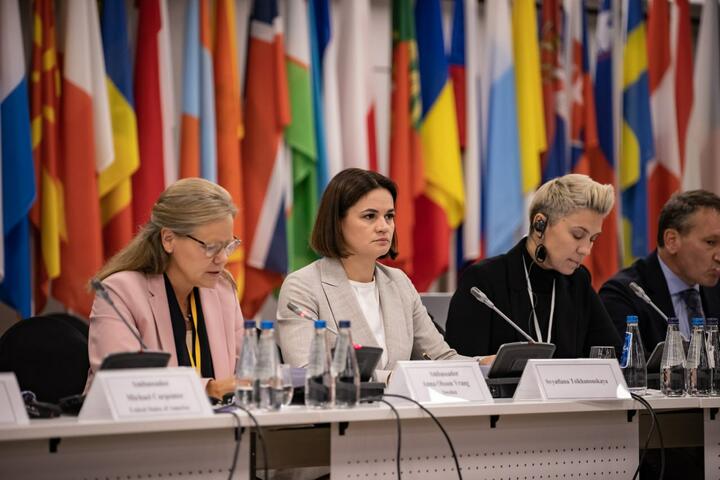Democratic forces intensify dialogue with the West, Lukashenka scares it with the nuclear weapons and counts on its fatigue
 The situation has not changed
The situation has not changed

Belarusian democratic forces in exile continue to build institutional contacts with Western institutions and states. Another part of the democratic forces continues to collect evidence of the involvement of the Lukashenka regime in war crimes against Ukraine. Lukashenka himself feels quite confident, hiding behind Russian nuclear weapons, and, together with the Kremlin, hopes for a reduction in military support for Ukraine from the West as a result of a change of power in Europe and the United States. The hope is that this will allow relations with the West to be reset without any concessions from the regime.
Sviatlana Tsikhanouskaya and the representative of the United Transitional Cabinet (UTC) for social policy, Volha Harbunova, took part in the OSCE side event on Belarus, which took place today in Warsaw. At the event, the creation of a group of “Friends of Democratic Belarus” from OSCE participating countries was announced. Tsikhanouskaya called on the ODIHR and the OSCE Secretariat to demand access to political prisoners in Belarus and publicly demand access to trials, as well as help bring the Lukashenka regime to justice, Tsikhanouskaya’s Office reports.
Deputy Head of the Joint Transitional Cabinet, Valery Kavaleuski, summed up the results of his trip to the United States. In Washington, he met with the leadership of relevant areas in the State Department, as well as with representatives of both houses of Congress, and a representative of the National Security Council in the White House. At the meetings, questions were raised about the threat to the independence and national identity of Belarus, which is increasingly posed by Russia and the dictatorial regime. Much attention was paid to the right of Belarusians to make a geopolitical choice in favor of joining the European Union and, accordingly, the Transatlantic Community. Another topic of discussion was the strategic dialogue between Belarus and the United States, which will begin in December. In addition, sanctions against the Lukashenka regime and the preparation of the fifth version of the “Law on Democracy in Belarus, Sovereignty and Human Rights” were discussed.
EU High Representative for Foreign Affairs and Security Policy, Josep Borrel, invited Sviatlana Tsikhanouskaya to speak to the foreign ministers of the EU countries on the topic of strategy for Belarus. Tsikhanouskaya called on Borrel to appoint a special envoy or coordinator for Belarus and together develop a common EU strategy for Belarus and work within its framework.
Meanwhile, diplomats from Western countries did not go at the invitation of the Belarusian Foreign Ministry to visit Navapolatsk and meet with Ukrainian children who are in the country. Earlier, the Ukrainian Foreign Ministry called on foreign diplomats to ignore Minsk’s invitation and refrain from visiting the locations of Ukrainian children. At the same time, diplomats from other states went on the trip.
In response, the Belarusian Foreign Ministry accused Western diplomats of unwillingness to understand the situation with Ukrainian children. Minsk rejects all accusations made against the Belarusian side on this issue. Allegedly, the arrival of each child in Belarus is possible only with the written consent of his parents or legal representatives and is accompanied by authorized adults. At the end of the shift, which lasts 21 days, each child will return home.
However, Belarusian democratic forces continue to collect materials for the International Criminal Court (ICC), proving the involvement of representatives of the Lukashenka regime in the illegal removal of Ukrainian children. The National Anti-Crisis Management believes that with such meetings with the participation of foreign diplomats, the Lukashenka regime is trying to legalize war crimes.
Lukashenka himself is not very worried about these statements and is not going to make any concessions to the West. October began with an increase in migrant activity on the border of Belarus with EU countries. So on October 1, 318 foreigners tried to cross the borders with Lithuania, Latvia and Poland.
He recalled once again the presence of Russian nuclear weapons and also threatened their use by Russia if the West does not stop supplying arms to Ukraine. According to Lukashenka, the conflict in Ukraine was planned. The United States “identified Ukraine as a victim, promising it maximum support, and the Ukrainian authorities agreed to this role.”
However, both the Kremlin and Lukashenka expect that the West will become increasingly tired of supporting Ukraine. And Western politicians, wanting to be elected or re-elected, will take into account the sentiments of that part of the electorate that is not enthusiastic about sanctions and arms supplies to Kyiv. Therefore, special hope is placed on the return of Donald Trump to the White House in 2024. Lukashenka even claims that Polish diplomats hope to reset relations with Belarus after the parliamentary elections if the ruling Law and Justice party is defeated. According to his forecasts, all this will lead to a serious restructuring of geopolitical processes, in which Europe, relying on the new government in Germany, France and Poland will begin to turn away from the United States towards Russia and Belarus.
Subscribe to our newsletter




Situation in Belarus
Constitutional referendum: main consequences


 Video
Video
How to count the political prisoners: are the new criteria needed?


 Video
Video
Paternalism In Decline, Belarusian Euroscepticism, And The Influence Of Russia


 Video
Video












